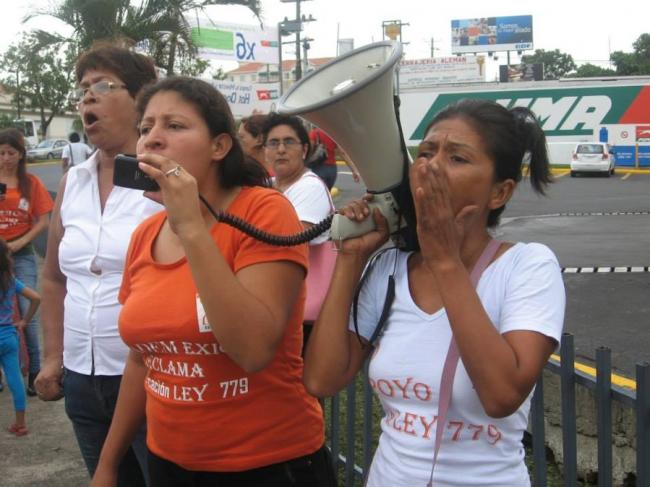by PAMELA J. NEUMANN
 Women in Managua protested reforms to Ley 779 in summer 2013 PHOTO/Pamela Neumann
Women in Managua protested reforms to Ley 779 in summer 2013 PHOTO/Pamela Neumann
Five years after Nicaragua passed a comprehensive law against gender-based violence, a lack of resources and political undermining has weakened women’s rights and legal protection against abuse.
It was barely 8 AM, but the sun was already blazing in northeastern Managua, Nicaragua where I had joined several dozen women for a demonstration in front of the airport in the summer of 2013. Holding colorful handmade signs and banging drums, women of all ages barricaded the highway, chanting: “Ya es hora, ya es tiempo, que las mujeres vivamos sin violencia!” [It’s about time that women live without violence!]
Studies estimate that one out of every two women in Nicaragua has experienced some form of violence in her lifetime. Like many countries, the Nicaraguan government’s steps to address such violence have often been frustratingly slow. In 2012, local feminists found reason to celebrate when, after an arduous two-year grassroots campaign, a comprehensive new law addressing gender-based violence (Ley Integral Contra la Violencia Hacia Las Mujeres, or Ley 779) finally passed. For the first time, Ley 779 acknowledged that violence against women stems from “unequal relations of power” between men and women. It defined femicide as a specific crime, and expanded the legal definition of gender-based violence to include economic and psychological violence against women, among other provisions for stronger protective measures.
Their moment of victory was short-lived, however. Within two years, most of the major advances contained in Ley 779 were overturned. Not long afterwards, women’s organizations were stunned when the police units charged with handling gender violence cases—the comisarías de la mujer —were shut down altogether in early 2016. Despite a resurgence of feminist activism to demand state accountability for rampant femicide rates, like the Ni Una Menos campaign, over the past few years in Nicaragua, protections against gender-based violence have been diluted and undermined.
